Clandestine life at the Myanmar border
The new anti-migration policy in Thailand and the civil war in Myanmar have thrown the border area into turmoil. Faced with the horror from […]
In the working areas of Phuket, near the fishing port, one lady has been fighting for over a decade to give a place to a discriminated minority: migrants from Myanmar. An increasing number of Burmese migrants, who are key to the local economy and rely on low salaries, are trying their chances in Thailand. Sister Lakana is trying to integrate these people who are fighting for a future into Thai society with the help of school.
Text: Fantine Verleene – Photos: Antoine Besson
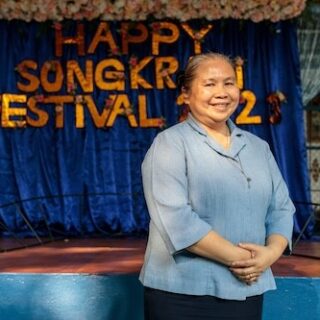
A small lady with smiling eyes, Sister Lakana is not the kind of lady you would expect to come across in the streets of Phuket, especially as her uniform of a black veil on her head and a blue dress seems to show that she has dedicated her life to other realities, other battles, and another love. It is far from the beach fun, Instagrammable scenes and water games that have given this small corner of Thailand its global reputation. However, Sister Lakana is certainly at home in this area of mass-tourism. She is in the right place not to be served, but to serve. “It’s the most wonderful mission, serving children who have nothing and who have to work to survive” she says.
Lakana is a sister of the Good Shepherd whose mission is to come to the aid of those most in need and victims of human trafficking and abuse. Every day, this 59-year-old energetic little lady embraces the fight of those who live on the doorstep of these paradisical beaches, armed with only education, the support of a small army of volunteers and teachers, and a good meal.
Originally from the ancient royal Thai city of Ayutthaya, Lakana Sukhsuchit was sent to the Nong Khai province in the north, then to India, before being sent on mission to Phuket in 2009. Here, we asked her to found a mission to fight against human trafficking. There was nothing to start with and everything to do. “I didn’t have any experience in this field, I didn’t really know what it meant nor where to start. The only thing I knew for certain was that I had to do my best because God had sent me here.”
The image of these young children doing extremely hard work still haunts me.
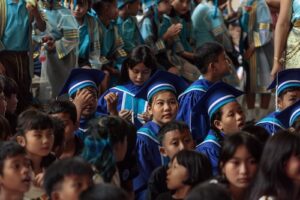
Sister Lakana arrived at the same time as Church humanitarian projects finished. The projects had been in place following the tsunami that hit southern Thailand in 2004. She helped with the final part of a healthcare project to support migrant communities in Phuket before she began her own mission. It was there that she discovered the other side of the beautiful scenery shown on tourism posters. During the first six months of the project, Sister Lakana improved her understanding of the challenges around the fight against human trafficking: “At first, I believed that the fight against human trafficking was connected only to the sex industry in Phuket. I was not aware that exploitation of migrant workers in extremely insecure conditions was another example of trafficking.”
Individuals, even families, are recruited in Myanmar to work in Thailand, much in the same way that young girls from poor areas in Thailand are brought to Phuket for the sex industry. “The motivations are the same in both scenarios: they have been promised a better life and a good salary.”
Once they arrive in Phuket, they are exploited by their employer, piled into unsanitary buildings, and cannot exercise their rights because they entered the country illegally. Migrants often are also victim to a lot of abuse that they cannot escape. It is impossible for them to return to Myanmar without working first to earn enough money to pay not only for the journey and passage out of Phuket, but also to get back into Myanmar. Most of them are forced to work in fish-drying factories or on construction sites for a measly salary.
Already revolted by this situation, Sister Lakana discovered that exploitation began at a very young age: “Each time we would visit a building site, we would see children carrying bricks and working with their parents. The unbearable image of these young children doing extremely hard work still haunts me today.”
Sister Lakana knows then that she has found her mission in Phuket: to offer a decent life and a better future to these children. The question of means doesn’t even arise: it will be the school, a mobile school that comes to meet them since they cannot go there themselves.
“We would go from factories to construction sites and try to gather the children to teach them.”
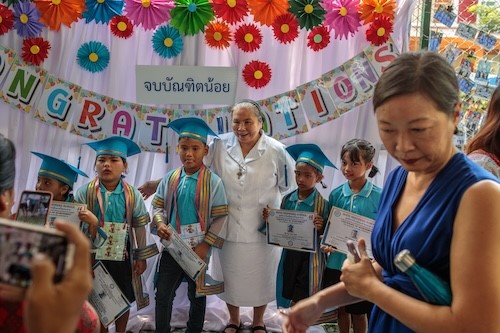
LIFE AT SISTER LAKANA’S CENTRE
In August 2010, less than a year after the school was opened, the owner of a fish-drying factory, whom Sister Lakana had been repeatedly asking for help, finally agreed to give her a room where she could teach a small class of working children. Lakana believed that this would be an opportunity to give parents more freedom and efficiency in their work. Nothing stood in her way, and the school is a great success! For two years, the number of children joining the class continued to increase, up until 2012 when the owner became overwhelmed by the number of children and refused to continue letting them use his room.
Sister Lakana did not let herself be beaten. Strengthened by the ever-growing number of children who were counting on her, she developed and built her own school in 2013, The Good Shepherd Learning Center for Burmese Children. Ten years later, the centre welcomes more than 380 Burmese children every day and employs ten Thai and Burmese teachers, a number that has considerably increased over the last two years due to the civil war in Myanmar. The centre has become an institution in Phuket and provides migrant children with their only opportunity to go to school.
“All children have the right to an education and should be able to go to school, whether they have legal papers for Thailand or not! Our objective is to protect them, give them the opportunity for a better future and to make them aware of their rights and their value. Our school is a unique place in their life, where they know they are safe and can learn and grow.”
When we asked Sister Lakana what had changed between her first year in Phuket and now, she was very optimistic in her response: “Before, parents did not show any interest in sending their children to school, they just waited until they were 9 or 10 years old and were able to get a job and earn money. We have been fighting for a long time for the right to education for these children. We would spend our evenings visiting families in the community and pleading with parents to let their children come to school. The mentality has really evolved since then. Most parents understand the benefits of education. Many pupils, who are of primary age at our school, have been able to continue their education at a Thai state school for secondary school and college.”
Among the now-qualified students, some have gone on to be interpreters in hospitals and clinics because they speak Thai and Burmese fluently. These examples have helped parents to understand that thanks to school, their children could better integrate in Thai society and qualify for better jobs with a stable and regular salary. At Sister Lakana’s centre, children are taught based on the Burmese curriculum alongside the Thai and English ones, giving families greater freedom: it allows them to choose between going back to Myanmar and continuing their child’s education there, or staying in Thailand and joining the Thai state school system. Sister Lakana is in direct contact with the state schools so she can send students to them every year. This is an important contact to have because the government only gives subsidies to state schools for pupils who have official Thai papers. Accepting Burmese children therefore costs more for the school, meaning that it is done based on the goodwill of each head teacher and is not easy to get accepted.

This is one of Sister Lakana’s concerns for the future. “We currently have a lot of children who were born in Thailand after their parents migrated from Myanmar. They know Thailand, have never lived in Myanmar, and sometimes speak better Thai than they do Burmese. But these children will grow up and if they are not recognised by the Thai government, they will be stateless. We are currently in discussion with the authorities about this problem.” Today, the school represents a very solid solution for these hundreds of children. “My hope is that if a young person from Myanmar graduates from a Thai university, they will automatically obtain Thai nationality. It is therefore absolutely vital that we encourage them to enter the Thai system and go to university.”
The success of these children has become my biggest source of happiness.
There are so many wonderful stories that bring hope. Si Lar is a young boy from Myanmar. Sister Lakana met him and his brother during her first year while they were working on construction sites with their parents. He joined the school to learn Thai and was then able to go to a state school where he continued his studies. Si Lar now has a technical diploma and is a site manager. He is still on the same construction site where Sister Lakana met him, but he is no longer 8 years old. He now has a good job and a salary that allows him to live well. Sister Lakana tells us that she had a phone call from Si Lar one day when he told her “I am very thankful for the opportunity you gave me. You’re like a mother to me”. She hastens to add “that does not mean I’m proud of myself, it is simply that the success of these children has become my biggest source of happiness”.
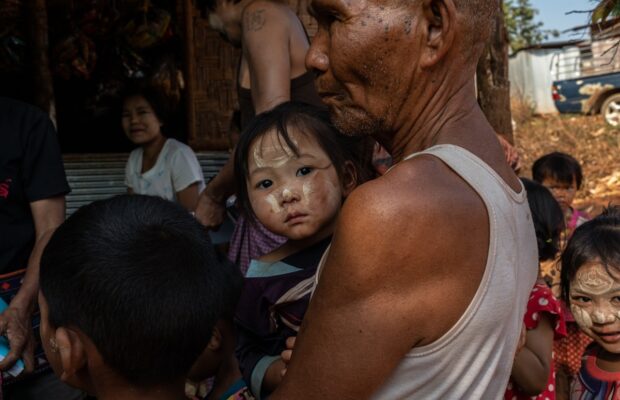
The new anti-migration policy in Thailand and the civil war in Myanmar have thrown the border area into turmoil. Faced with the horror from […]
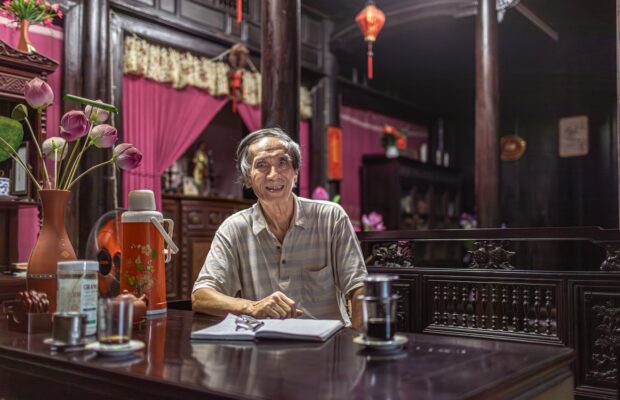
In central Vietnam, Mr. Trang is fighting a relentless battle against injustice and poverty. He is surrounded by an army of young people with […]